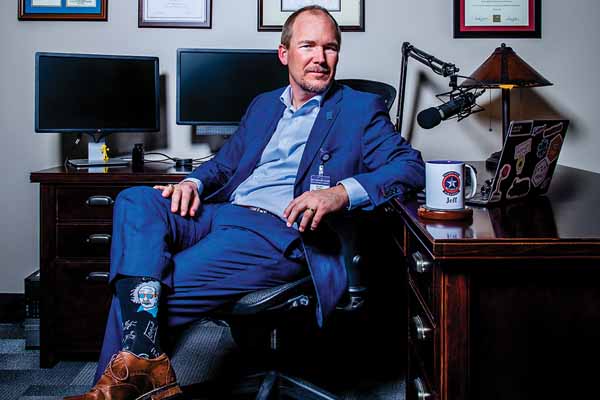
Based on his resume alone, Jeffrey Jarvis, MD, is unquestionably an expert in emergency medicine.
A physician and a paramedic, Dr. Jarvis is medical director for two emergency medical services (EMS) departments – one in Williamson County just north of Austin and one in Marble Falls in the heart of the Hill Country. He is also on the emergency medicine faculty at Texas A&M College of Medicine’s Baylor Scott and White Medical Center and practices in the emergency department at Baylor Scott & White in Round Rock.
But no matter how many patients he’s cared for or how many research papers he’s written, Dr. Jarvis ultimately considers himself a teacher.
“I still think that’s what I do as a doctor,” Dr. Jarvis told Texas Medicine. “I like to point out that the word doctor comes from the Latin docere, which means to teach. So I just think of myself as a teacher.”
That love of teaching is what propelled him into his latest undertaking: hosting a nationally distributed podcast.
EMS Lighthouse Project Podcast, which Dr. Jarvis co-hosts with a paramedic from Oregon, focuses on EMS research. It is distributed through FlightBridgeEd, which produces educational materials designed to help medical professionals pass advanced certification exams. (You can find the episodes under the podcasts tab at www.flightbridgeed.com.)
Episode topics have ranged from clinical studies on whether rapid sequence intubation by EMS helps or harms stroke patients, to research on the benefits and risks of responding to and from calls with lights and sirens.
“It’s an adjunct to medicine,” Dr. Jarvis said of the podcast, which in November had reached 15 episodes. “It’s one additional way to teach about medicine and science – one more tool in the toolbox. The fundamental mission isn’t any different: take care of patients and help other people take care of patients.”
Here are more highlights from Texas Medicine’s interview with Dr. Jarvis.
How did the podcast come about?
FlightBridgeED came to me about six or seven months ago and asked me to help out as a subject matter expert. We discussed several ways to collaborate, but I wanted to do a podcast. I had been interviewed on a couple of different podcasts based on some research I’d done and some lectures I’d given. I drive a lot – I have about a 30-minute commute, so I listen to a lot of podcasts. We sat down and started thinking about what we can do, looking for our niche and trying to plan it out.
EMS research seems like a pretty narrow niche.
Unfortunately, there’s not a lot of research in EMS. I have paramedics come to me who want to learn more, but there isn’t a whole lot out there to learn. So I wanted to create a podcast that would inspire paramedic researchers, and to give paramedics an avenue to learn more about research. I also wanted to help decrease the knowledge translation gap – basically how long it takes from when we learn something in science to the time when it’s adopted in clinical practice.
What’s the process for producing each episode?
I have recording material at home – I have a mic set up and a digital audio work station and a recorder. Some episodes I record on my own, some are discussions between me and my cohost Mike (Verkest), and sometimes we have guests: authors of papers or other subject matter experts.
When we started off, there was very little preparation. In an early podcast we focused on a pretty big chunk of research – the science behind epinephrine and cardiac arrest – and it turns out it’s all over the place. There were three or four papers that we chewed off, and we ended up talking for about an hour and a half. That’s a bit on the long side for a podcast.
Now I’m shifting to be a little more structured: I’m trying out scripts, where I’ll sit down and actually write out a script as opposed to just completely winging it. I’m getting it to about 20 to 30 minutes, so I think it helps me focus a little bit more.
How has the feedback been?
Feedback’s been good. Seems there are a lot of people who are really interested in this. I’m having a blast. Ask me in five years if I’m still having a blast, but right now I am.
Tex Med. 2020;116(1):6-7
January 2020 Texas Medicine Contents
Texas Medicine Main Page